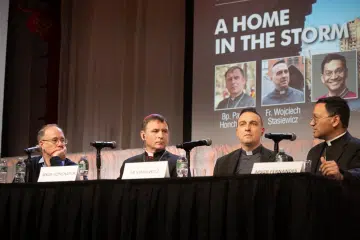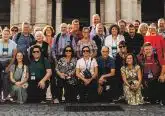Seek the Lord for April 2024

Jesus was not afraid to be controversial. Declaring sins forgiven, speaking of His relationship with God the Father, and teaching the necessity to love our enemies all created a stir in Jesus’ day. Various aspects of His teachings remain controversial to this day. For example, Jesus said, “If you remain in my word, you will truly be my disciples, and you will know the truth, and the truth will set you free” (Jn. 8:31- 32). In quick succession He uses the word truth three times, emphasizing the importance of that reality. Yet Pilate would later question Jesus, asking, “What is truth?” (Jn. 18:38).
Even today many people assert that objective truth does not exist outside of subjective experience. We firmly believe, however, that is not the case. In the introduction to his encyclical Fides et Ratio (FR), Pope St. John Paul II said, “God has placed in the human heart a desire to know the truth.” All of us, then, knowingly or unknowingly, are on a quest to learn more about the world around us and our place in that world. For His part, God has constantly been at work to reveal to us the truth underlying all of creation, namely who He is and who we are in relationship to Him.
Christ, the incarnate Word of God, speaks the truth not only through His words, but also through His actions and the Holy Spirit, which He sent after His Passion and Resurrection. Reflecting on this reality, the Fathers of the Second Vatican Council stated, “Christ… by the revelation of the mystery of the Father and His love, fully reveals man to man himself and makes his supreme calling clear. It is not surprising, then, that in Him all the aforementioned truths find their root and attain their crown” (Gaudium et Spes, 22).
hrough all our scientific and intellectual pursuits, we are ultimately seeking to know the truth about ourselves and to find answers to the most fundamental questions: Who am I? What is the purpose of my life? What is good and what is evil? Is there something more than this life? These questions, though, cannot be answered by science alone; we must rely also on the Revelation we have received from God. It is our faith which opens up the fullness of the mystery of creation and helps us to understand how we are to interact with each other and the world in which we live.
Faith and science thus are not in competition with each other. Rather they inform each other, each contributing to the fullness of knowledge which we seek to possess. Pope St. John Paul II spoke about this relationship clearly: “The world and all that happens within it, including history and the fate of peoples, are realities to be observed, analyzed, and assessed with all the resources of reason, but without faith ever being foreign to the process. Faith intervenes not to abolish reason’s autonomy nor to reduce its scope for action, but solely to bring the human being to understand that in these events it is the God of Israel who acts. Thus the world and the events of history cannot be understood in depth without professing faith in the God who is at work in them” (FR, 16).
As we live in this world and study and explore all its various facets, we must never lose sight of the fact that God has created everything to reveal His love for us and to guide us along the path which leads to fully sharing in that love forever in heaven.













